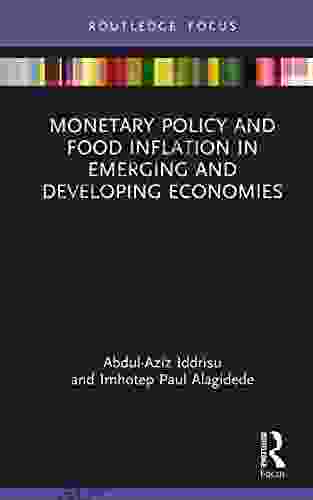Monetary Policy and Food Inflation in Emerging and Developing Economies: Tackling the Root Causes

Food inflation is a persistent challenge in emerging and developing economies, threatening food security and economic stability. Monetary policy, a key tool for managing inflation, has often been used to address this issue. However, the effectiveness of monetary policy in controlling food inflation is complex and depends on the underlying causes and structural characteristics of the economy.
5 out of 5
| Language | : | English |
| File size | : | 5916 KB |
| Screen Reader | : | Supported |
| Print length | : | 269 pages |
This book provides a comprehensive analysis of the relationship between monetary policy and food inflation in emerging and developing economies. It explores the various causes of food inflation, including supply-side factors, demand-side pressures, and external factors. The book also examines the effectiveness of different monetary policy tools, such as interest rate adjustments, reserve requirements, and exchange rate management, in addressing food inflation.
Causes of Food Inflation
Food inflation can be caused by a variety of factors, including:
- Supply-side factors: These include factors that affect the production and distribution of food, such as weather conditions, crop diseases, transportation disruptions, and supply chain bottlenecks.
- Demand-side factors: These include factors that increase the demand for food, such as population growth, rising incomes, and changes in dietary patterns.
- External factors: These include factors that affect the global food market, such as commodity price fluctuations, trade policies, and geopolitical events.
The relative importance of these factors can vary depending on the country and the specific period of time.
Effectiveness of Monetary Policy in Controlling Food Inflation
The effectiveness of monetary policy in controlling food inflation depends on several factors, including:
- The type of inflation: Monetary policy is more effective in controlling demand-driven inflation than supply-driven inflation.
- The transmission mechanism: Monetary policy works by affecting the cost and availability of credit in the economy. However, the transmission mechanism may be weak in some emerging and developing economies, limiting the effectiveness of monetary policy.
- The structural characteristics of the economy: The effectiveness of monetary policy can also be affected by the level of financial development, the size of the informal sector, and the degree of price stickiness.
Empirical evidence suggests that monetary policy can be effective in controlling food inflation in some cases, but not in others. In particular, monetary policy is more likely to be effective when inflation is demand-driven and when the transmission mechanism is strong.
Policy Recommendations
The book concludes with a set of policy recommendations for managing food inflation in emerging and developing economies. These recommendations include:
- Addressing supply-side constraints: Governments should invest in agricultural research and development, improve infrastructure, and reduce trade barriers to increase food production and reduce supply-side pressures.
- Managing demand-side pressures: Monetary policy can be used to moderate demand-side pressures, but should be used cautiously to avoid unintended consequences.
- Strengthening the transmission mechanism: Governments should implement reforms to improve the financial system and reduce the size of the informal sector.
- Coordinating with other policies: Monetary policy should be coordinated with other policies, such as fiscal policy and trade policy, to address food inflation effectively.
By implementing these recommendations, policymakers can improve the effectiveness of monetary policy in controlling food inflation and promote food security and economic stability in emerging and developing economies.
Food inflation is a complex problem with multiple causes. Monetary policy can be an important tool for controlling food inflation, but its effectiveness depends on a variety of factors. By understanding the causes of food inflation and the effectiveness of monetary policy, policymakers can design and implement policies that effectively address this pressing issue.
5 out of 5
| Language | : | English |
| File size | : | 5916 KB |
| Screen Reader | : | Supported |
| Print length | : | 269 pages |
Do you want to contribute by writing guest posts on this blog?
Please contact us and send us a resume of previous articles that you have written.
 Book
Book Novel
Novel Page
Page Chapter
Chapter Text
Text Story
Story Genre
Genre Reader
Reader Library
Library Paperback
Paperback E-book
E-book Magazine
Magazine Newspaper
Newspaper Paragraph
Paragraph Sentence
Sentence Bookmark
Bookmark Shelf
Shelf Glossary
Glossary Bibliography
Bibliography Foreword
Foreword Preface
Preface Synopsis
Synopsis Annotation
Annotation Footnote
Footnote Manuscript
Manuscript Scroll
Scroll Codex
Codex Tome
Tome Bestseller
Bestseller Classics
Classics Library card
Library card Narrative
Narrative Biography
Biography Autobiography
Autobiography Memoir
Memoir Reference
Reference Encyclopedia
Encyclopedia Sophie Ratcliffe
Sophie Ratcliffe Shari Hearn
Shari Hearn Seth Rosenfeld
Seth Rosenfeld Sophie Kinsella
Sophie Kinsella Sm Howard
Sm Howard Starla Night
Starla Night John Alanis
John Alanis Ron Clark
Ron Clark Robin Blackburn
Robin Blackburn Tanya Agathocleous
Tanya Agathocleous Stephen Robert Stein
Stephen Robert Stein Rosie Avila
Rosie Avila Richard M Valelly
Richard M Valelly Stacey L Smith
Stacey L Smith Walker Percy
Walker Percy Richard Schulick
Richard Schulick Valerie Hansen
Valerie Hansen Velsoft Training Materials Inc
Velsoft Training Materials Inc Surya Monro
Surya Monro Theodora Taylor
Theodora Taylor
Light bulbAdvertise smarter! Our strategic ad space ensures maximum exposure. Reserve your spot today!

 Francisco CoxBecoming Brooke Quinn: A Journey of Redemption and Self-Discovery at Valley...
Francisco CoxBecoming Brooke Quinn: A Journey of Redemption and Self-Discovery at Valley...
 Michael ChabonDiscover the Enchanting World of "Or Tales From The Chickenyard And Beyond"
Michael ChabonDiscover the Enchanting World of "Or Tales From The Chickenyard And Beyond"
 Thomas PowellFierce Mobs, Brilliant Scoundrels, and the President's Mission to Destroy the...
Thomas PowellFierce Mobs, Brilliant Scoundrels, and the President's Mission to Destroy the...
 Alexander BlairCamelot Forever: Lancelot's Redemption: Embark on a Timeless Epic Fantasy...
Alexander BlairCamelot Forever: Lancelot's Redemption: Embark on a Timeless Epic Fantasy... Gordon CoxFollow ·11.1k
Gordon CoxFollow ·11.1k Jack PowellFollow ·19.2k
Jack PowellFollow ·19.2k Mikhail BulgakovFollow ·4.3k
Mikhail BulgakovFollow ·4.3k Miguel de CervantesFollow ·4.6k
Miguel de CervantesFollow ·4.6k Ruben CoxFollow ·15.7k
Ruben CoxFollow ·15.7k Brian WestFollow ·19.6k
Brian WestFollow ·19.6k Gilbert CoxFollow ·6.4k
Gilbert CoxFollow ·6.4k Richard SimmonsFollow ·5.6k
Richard SimmonsFollow ·5.6k

 Harry Cook
Harry CookRape Blossoms and White Sky: A Floral Symphony of...
A Kaleidoscope of Colors...

 Vic Parker
Vic ParkerThe Passion of Jovita Fuentes: Unveiling the...
Immerse yourself in the...

 Cormac McCarthy
Cormac McCarthySinners and Saints: A Dark New Adult High School Bully...
Sinners and Saints is...
5 out of 5
| Language | : | English |
| File size | : | 5916 KB |
| Screen Reader | : | Supported |
| Print length | : | 269 pages |










